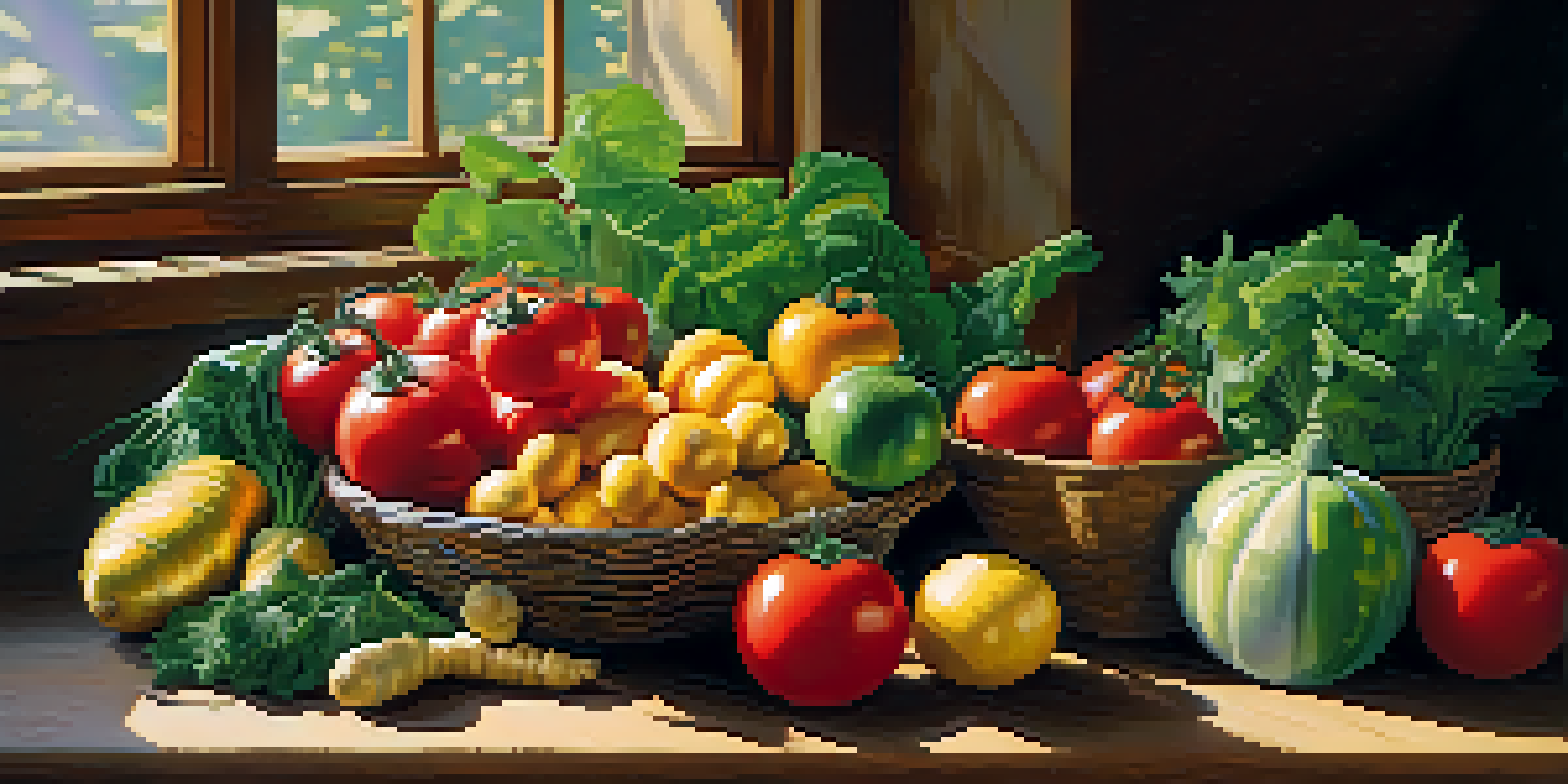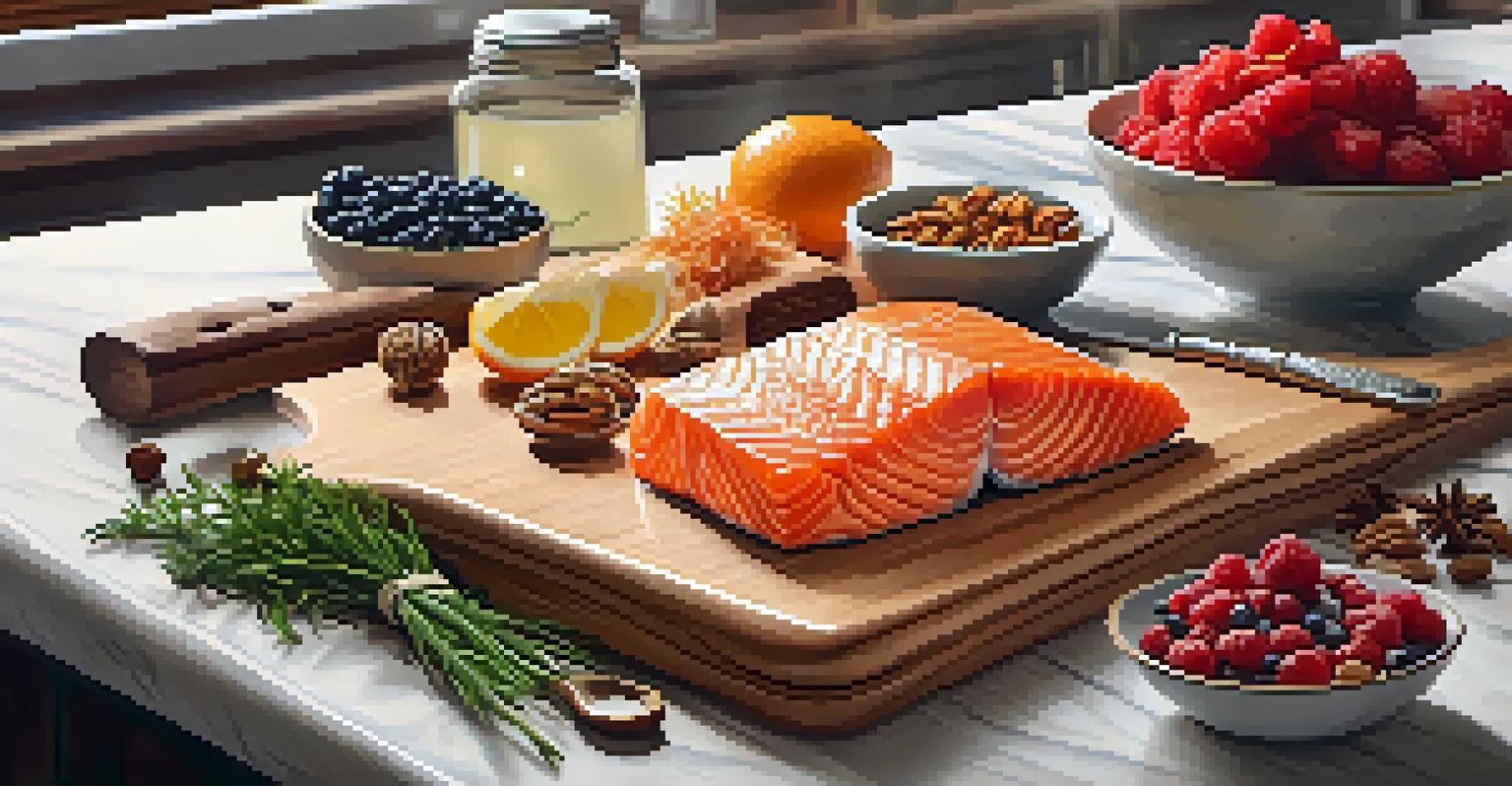Food as Medicine: Using Nutrition to Support Healing

Understanding Food as Medicine in Healing
The concept of food as medicine emphasizes the healing potential of nutrition. It suggests that what we eat can significantly impact our health and recovery processes. For instance, a diet rich in fruits and vegetables can boost your immune system and speed up healing.
Let food be thy medicine and medicine be thy food.
This philosophy isn't new; ancient cultures have long recognized the therapeutic properties of certain foods. From turmeric's anti-inflammatory benefits to garlic's immune-boosting qualities, these ingredients have been used for centuries to support health. Today, modern science is validating these traditional practices.
By viewing food as a form of medicine, we can make more intentional choices about our diets. This approach encourages us to look at food not just for sustenance but as a vital tool for promoting overall well-being and recovery.
The Role of Nutrients in Healing
Nutrients like vitamins, minerals, and antioxidants play crucial roles in the healing process. For example, vitamin C is essential for collagen production, which is vital for wound healing. Similarly, zinc helps our immune system function properly, aiding recovery from illness.

When we consume a balanced diet that includes a variety of nutrients, we equip our bodies with the tools they need to heal. Think of it like giving your body the right ingredients to bake a cake; without the right components, the final product won't turn out as intended.
Food as Healing Tool
Viewing food as medicine encourages intentional dietary choices that promote health and recovery.
Moreover, the synergy between different nutrients can enhance our body's healing capabilities. For instance, combining vitamin D with calcium can improve bone health, illustrating how food works in concert to support our healing journeys.
Anti-Inflammatory Foods for Recovery
Inflammation is a natural response to injury or illness, but chronic inflammation can hinder recovery. Incorporating anti-inflammatory foods into your diet can help manage this process. Foods like berries, fatty fish, and leafy greens are known for their anti-inflammatory properties.
The doctor of the future will no longer treat the human frame with drugs, but rather will cure and prevent disease with nutrition.
For example, omega-3 fatty acids found in salmon can help reduce inflammation in the body, potentially speeding up recovery times from injuries. Similarly, foods rich in antioxidants, such as dark chocolate and nuts, can combat oxidative stress that contributes to inflammation.
By consciously choosing anti-inflammatory foods, we can create a diet that supports healing. This proactive approach can make a significant difference in how we feel and recover from various health challenges.
The Impact of Gut Health on Healing
Our gut health plays a pivotal role in overall wellness and recovery. The gut houses trillions of bacteria that influence everything from digestion to immune function. A healthy gut can significantly enhance our body's ability to heal and fend off illness.
Probiotic-rich foods like yogurt, sauerkraut, and kefir can promote a healthy gut microbiome. These foods help maintain a balance of beneficial bacteria, which can improve nutrient absorption and support immune health. It's like having a personal army defending your body!
Nutrients Aid Recovery
Essential nutrients like vitamins and minerals play crucial roles in healing processes and overall wellness.
Conversely, a diet high in processed foods can disrupt this balance, leading to various health issues. By prioritizing gut-friendly foods, we can harness the power of our microbiome to support healing and overall health.
Hydration: The Unsung Hero of Healing
While we often focus on what we eat, hydration is equally crucial for healing. Water plays a vital role in every bodily function, including nutrient transportation, temperature regulation, and waste elimination. Without adequate hydration, our bodies can't perform optimally.
Staying hydrated helps maintain blood volume and circulation, essential for delivering nutrients to tissues that need repair. It also aids in flushing out toxins, making room for healing. Think of it as keeping a well-oiled machine running smoothly.
Incorporating hydrating foods like cucumbers, oranges, and soups can make staying hydrated easier. By prioritizing hydration, we can enhance our recovery processes and support our overall well-being.
The Mind-Body Connection in Nutrition
Nutrition isn't just about physical health; it's also closely linked to mental well-being. The foods we consume can affect our mood, energy levels, and overall mental clarity. This connection underscores the importance of a balanced diet in supporting not just physical healing, but emotional resilience.
For instance, foods rich in omega-3 fatty acids, like walnuts and flaxseeds, have been shown to boost brain health and mood. Similarly, complex carbohydrates, such as whole grains, can help regulate serotonin levels, contributing to a sense of well-being.
Hydration Supports Healing
Staying hydrated is vital for optimal bodily functions, aiding in recovery and nutrient delivery.
Understanding this mind-body connection can motivate us to make healthier food choices. By nourishing our bodies and minds, we create a more holistic approach to healing that addresses our well-being on multiple levels.
Practical Tips for Implementing Food as Medicine
Incorporating the concept of food as medicine into your daily life doesn't have to be overwhelming. Start by focusing on whole, unprocessed foods, like fruits, vegetables, whole grains, and lean proteins. These foods provide the nutrients your body needs to heal and thrive.
Meal prepping can also be a game-changer. By planning your meals ahead of time, you can ensure you're making nutritious choices, even on busy days. Think of it as setting yourself up for success in your healing journey.

Finally, listen to your body. Pay attention to how different foods make you feel and adjust your diet accordingly. Embracing food as medicine is a personal journey, and small changes can lead to significant improvements in your health and well-being.